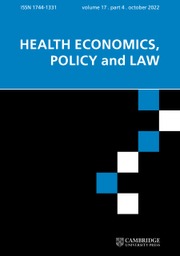Article contents
Delivering better end-of-life care in England: barriers to access for patients with a non-cancer diagnosis
Published online by Cambridge University Press: 19 October 2012
Abstract
The End of Life Care Strategy (Department of Health, 2008) radically raised the profile of end-of-life care in England, signalling the need for development in planning and delivery, to ensure that individuals are able to exercise genuine choice in how and where they are cared for and die. Research has indicated that there have been continuing difficulties in access to high-quality and appropriate support at the end of life, particularly for patients with a diagnosis other than cancer. This article uses research findings from three case studies of end-of-life care delivery in England to highlight some of the barriers that continue to exist, and understand these challenges in more depth. Access to high-quality and appropriate end-of-life care has been a challenge for all patients nearing the end of life. However, the findings from this research indicate that there are several interrelated reasons why access to end-of-life care services can be more difficult for patients with a non-cancer diagnosis. These issues relate to differences in disease trajectories and subsequent care planning, which are further entrenched by existing funding arrangements.
- Type
- Articles
- Information
- Copyright
- Copyright © Cambridge University Press 2012
References
- 4
- Cited by


